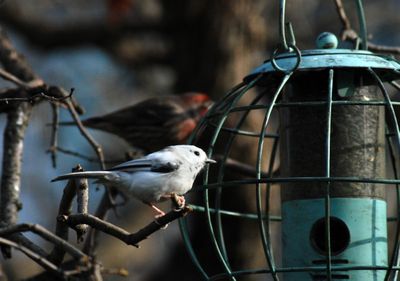Rare white chickadee visiting Valley couple’s yard
Frank and June Potter are longtime bird lovers

Weeks before the region’s first snowfall, Frank and June Potter were enjoying a “white” Christmas in the front yard of their Spokane Valley home.
Their feeders and heated water dish have attracted countless birds to their enjoyment over the years, but a little white bird showed up a few weeks ago with impeccable timing.
“We think it’s a white black-capped chickadee,” said Frank Potter, a World War II pilot and outdoorsman who has spent more time at the living room window since being diagnosed with a terminal illness. “It’s been coming twice a day with other chickadees and finches. It’s been fun.”
Although there’s some question about the bird’s species, a dozen experienced birders who have seen photos agree with Potter’s chickadee ID.
The bird is not an albino – its eyes are black. But its legs are pink and it’s mostly white, demonstrating a genetic mutation known as leucism.
Gary Blevins, Spokane Community College biology professor and local Audubon Society member, explains: “In general, albinism is the absence of pigment. Albino birds have absolutely no pigment in their feathers, bills or legs, and their eyes appear red.
“Leucism, which is often confused with albinism, means that a bird has feathers that appear lighter than normal or white.
“Leucistic birds usually have black eyes. Leucism can be partial or incomplete and exhibits bilateral symmetry. The chickadee in the picture has partial leucism. These chickadees usually have black on the wings, neck, and maybe on top the head.
“In recent years birders have reported leucistic robins, chickadees, house finches and wild turkeys in the Spokane area to Spokane Audubon.”
According to reports from Project Feeder Watch, a citizens’ online reporting database sponsored by the Cornell Lab of Ornithology, albinism-leucism is the most commonly observed bird abnormality, accounting for 61 percent of abnormalities reported by project participants across North America.
Pegging the occurrence in songbirds is virtually impossible. But researchers studying birds in the vast unvegetated Pacific island refuges where birds nest by the millions can give some educated perspective.
“I haven’t found an estimate of how often (albinism/leucism) occurs or whether some species are more prone to it than others, but we find it at a rate of one in several hundred thousand albatross chicks each year at Midway,” said Beth Flint, supervising wildlife biologist for the Pacific Remote Islands National Wildlife Refuge Complex based in Hawaii.
It’s fitting that a white chickadee would pay a visit this season to the Potters, another couple of rare birds.
Married for 68 years, their wildlife conservation column has been a hallmark of the Inland Northwest Wildlife Council newsletter. They not only have maintained a long trail of bluebird boxes, they also studied them and shared their wealth of knowledge.
Potter revealed a keen perspective on life as he watched the birds from his living room.
“June and I have been to 50 countries,” he said, recalling travel that started with his Air Force career. He has fond memories of participating in the Berlin Airlift and piloting B-29s, B-36s and later the all-jet B-52:
“We cruised at .77 mach,” he said with the precision of a pilot who has survived by thinking like a bird. “That is 77/100ths the speed of sound, which at 35,000 feet is around 500 mph.
“I’ve had a good and productive life, no regrets, and I’m content to take it day to day as it comes,” he added.
“And look, there’s the white chickadee again. Isn’t that something?”